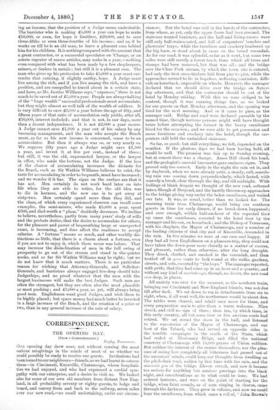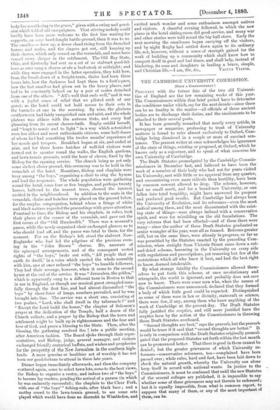CORRE SP ON DENCE.
Ru9by, Tennessee. OUR opening day drew near, not without rousing the most serious misgivings in the minds of most of Us whether we could possibly be ready to receive our guests. Invitations had been issuedto our neighbours—friends, as we had learnt to esteem them—in Cincinnati, Knoxville, Chatanooga, whose hospitali- ties we had enjoyed, and who had expressed a cordial sym- pathy with our enterprise, and a desire to visit us. We looked also for some of our own old members from distant New Eng- land, in all probability seventy or eighty guests, to lodge and board, and convey from and back to the railway, seven miles over our new road,—no small undertaking, under our circum-
stances. But the hotel was still in the hands of the contractor, from whom, as yet, only the upper floors had been rescued. The staircase wanted banisters, aud the hall and living-rooms were still only half-wainscoated, and full of carpenters' benches and plasterers' trays; while the furniture and crockery lumbered up the big barn, or stood about in cases on the broad verandah. As for our road, it was splendid, so far as it went, but some two miles were still merely a forest track, from which all trees and stumps had been removed, but that was all ; and the bridge over the Clear Pork stream, by which the town site is entered, had only the first cross-timbers laid from pier to pier, while the approaches seemed to lie in hopeless, welteriug confusion, diffi- cult on horseback, impossible on wheels. However, the manager declared that we should drive over the bridge on Satur- day afternoon, and that the contractor should be out of the hotel by Monday midday. With this we were obliged to be content, though it was running things fine, as we looked for our guests on that Monday afternoon, and the opening was fixed for the next morning. And so it came to pass, as the manager said. Bridge and road were declared passable by the named time, though nervous persons might well have thought twice before attempting the former in the heavy omnibuses hired for the occasion ; and we were able to get possession and move furniture and crockery into the hotel, though the car- penters still held the unfinished staircase.
So far, so good ; but still everything, we felt, depended on the weather. If the glorious days we had been having held, all would be well. The promise was fair up to Sunday evening, but at sunset there was a change. Amos Hill shook his head, and the geologist's aneroid barometer gave ominous signs. They proved only too correct. Early in the night the rain set in, and by daybreak, when we were already astir, a steady, soft, search- ing rain was coming down perpendicularly, which lasted, with scarcely a break, clear through the day, and till midnight. With feelings of blank despair we thought of the new road, softened into a Slough of Despond, and the hastily thrown-up approaches to the bridge giving way under the laden omnibuses, and waited our fate. It was, as usual, better than we looked for. The morning train from Chatanooga would bring our southern guests in time for early dinner, if no break-down happened; and sure enough, within half-an-hour of the expected time up came the omnibuses, escorted to the hotel door by the manager and his son, on horseback ; and the Bishop of Tennessee, with his chaplain, the Mayor of Chatanooga, and a number of the leading citizens of that city and of Knoxville, deseendedin the rain. In five minutes we were at our ease and happy. If they had all been Englishmen on a pleasure-trip, they could not have taken the down-pour more cheerily as a matter of course, and pleasant, rather than otherwise, after the long drought: They dined, chatted, and smoked in the verandah, and then trotted off in gum coats to look round at the walks, gardens, streets, and cots, escorted by "the boys." The manager reported, with pride, that they had come up in an hour and a quarter, and without any kind of contretemps, though, no doubt, the new road was deep, in places.
All anxiety was over for the moment, as the northern train, bringing our Cincinnati and New-England friends, was not due till after dark. We sat down to tea in detachments from six to eight, when, if all went well, the northerners would be about dine. The tables were cleared, and relaid once more for them, and every preparation made to give them a warm welcome. Nine struck, and still no sign of them ; then ten, by which time, in this early country, all brit some four or five anxious souls had retired. We sat round the stove in the hall, and listened to the war-stories of the Mayor of Chatanooga, and our host of the Tabard, who had served on opposite sides in the terrible campaigns in the south of the State, which had ended at Missionary Ridge, and filled the national cemetery of Chatanooga with 14,000 graves of Union soldiers. But neither the interest of the stories themselves, nor the plea- sure of seeing how completely all bitterness had passed out of the narrators' minds, could keep our thoughts from dwelling on the pitch-dark road, sodden by this time with the rain, and the maucals pas of the bridge. Eleven struck, and now it became too serious for anything but anxious peerings into the black night, and considerations as to what could be done. We had ordered lanterns, and were on the point of starting for the bridge, when faint sounds, as of men singing in chorus, came through the darkness. They grew in volume, and now we could bear the omnibuses, from which came a roll of, " John.Brown!s body lies mouldering in the grave," given with a swing and preci- sion which told of old campaigners. That stirring melody could hardly have been more welcome to the first line waiting for supports, on some hard-fought battle-ground, than it was to us. The omnibit,es drew up, a dense cloud rising from the drenched horses and mules, and the singers got out, still keeping up their chorus, which only ceased on the verandah, and must have roused every sleeper in the settlement. The Old Bay State, Ohio, and Kentucky had sent us a set of as stalwart good-fel- lows as ever sang a chorus or ate a beef-steak at midnight; and while they were engaged in the latter operation, they told how, from the break-down of a freight-train, theirs had been three hours late, how the darkness had kept them to a foot's-pace, how the last omnibus had given out in the heavy places, and had to be constantly helped on by a pair of mules detached from one of the others. "All's well that ends well," and it was with a joyful sense of relief that we piloted such of our guest3 as the hotel could not hold across to their cots in the barracks at one in the morning. By nine, the glorious southern sun had fairly vanquished rain and mist, and the whole plateau was ablaze with the autumn tints, and every leaf gleaming from its recent shower-bath. Rugby outdid herself, and "leapt to music and to light" in a way which astonished even her oldest and most enthusiastic citizens, some half-dozen of whom had had something like twelve months' experience of her moods and tempers. Breakfast began at six, and ended at nine, and for three hours batches of well-fed visitors were . turned out to saunter round the walks, the English gardens, and lawn-tennis grounds, until the hour of eleven, fixed by the Bishop for the opening service. The church being as yet only some six feet above ground, this ceremony was to be held in the verandah of the hotel. Meantime, Bishop and chaplain were busy among "the boys," organising a choir to sing the hymns and lead the responses. The whole population were gathering round the hotel, some four or five buggies, and perhaps twenty horses, haltered to the nearest trees, showed the interest excited in the neighbourhood. In addition to the seats in the verandah, chairs and benches were placed on the ground below, for the surplus congregation, behind whom a fringe of white and black natives regarded the proceedings with grave attention. Punctual to time, the Bishop and his chaplain, in robes, took their places at the corner of the verandah, and gave out the first verses of the "Old Hundredth." There was a moment's pause, while the newly-organised choir exchanged glances as to who should lead off, and the pause was fatal to them, for the moment. For on the Bishop's left stood the stalwart New- Englander who had led the pilgrims of the previous even- ing in the "John Brown" chorus. He, unaware of the episcopal arrangements, and of the consequent vested rights of "the boys," broke out with, "All people that on earth do dwell," in a voice which carried the whole assembly with him, and at once reduced "the boys" to humble followers. They had their revenge, however, when it came to the second hymn at the end of the service. It was "Jerusalem, the golden," which is apparently sung to a different tune in Boston to that in use in England, so though our musical guest struggled man- fully through the first line, and had almost discomfited "the boys" by sheer force of lungs, numbers prevailed, and he was brought into line. The service was a short one, consisting of two psalms, "Lord, who shall dwell in thy tabernacle ?" and "Except the Lord build the house," the chapter of Solomon's prayer at the dedication of the Temple, half a dozen of the Church collects, and a prayer by the Bishop that the town and settlement might be built up in righteousness and the fear and love of God, and prove a blessing to the State. Then, after the blessing, the gathering resolved its.' into a public meeting, after American fashion. The Board f*oke through their repre- sentatives, and Bishop, judge, general manager, and visitors exchanged friendly oratorical buffets, and wishes and prophecies for the prosperity of the New Jerusalem in the southern high- lands. A more genuine or healthier act of worship it has not been our good-fortune to attend in these late years.
Dinner began immediately afterwards, and then the company scattered again, some to select town lots, some to the best views, the Bishop to organise a vestry, and induce two of "the boys" to become lay readers, pending the arrival of a parson (in which he was eminently successful) ; the chaplain to the Clear Fork, with one of "the boys" fishing-rods, after black bass ; and a motley crowd to the lawn-tennis ground, to see some sets played which would have done no discredit to Wimbledon, and
excited much wonder and some enthusiasm amongst natives and visitors. A cheerful evening followed, in which the new piano in the hotel sitting-room did good service, and many war and other stories were told round the big hall stove. Early the next morning the omnibuses began carrying off the visitors, and by night Rugby had settled down again to its ordinary life, not, however, without a sense of strength gained for the work of building up a community which shall know how to comport itself in good and bad times, and shall help, instead of hindering, its sons and daughters in leading a brave, simple, and Christian life.—I am, Sir, Szc., VACIJUS VIATOR.







































 Previous page
Previous page